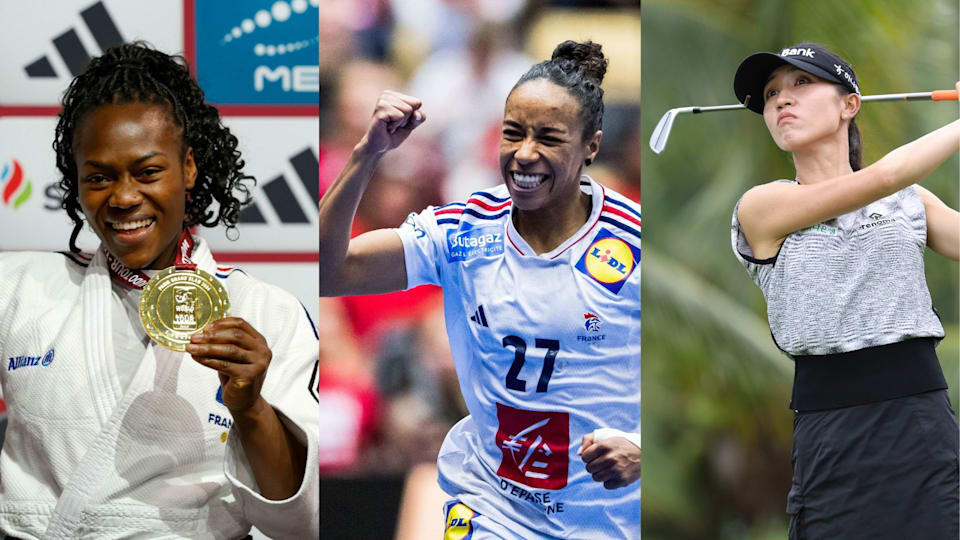A period that starts a conversation: Female athletes break the taboo on menstruation in elite sport

While the Olympic Games Paris 2024 will be the first edition to reach full gender parity among the athletes selected, other significant advances have also come to light over the past few years on the field of equity in sport: New mixed events, a better visibility of women's sport competitions, more top-level female coaches and officials.
But another topic is still slow in gaining ground - menstruation.
An increasing number of female athletes have been sharing their feelings about this regular occurence in their lives to break the taboo.
Since the straight-forward testimony from swimmer Fu Yuanhui who represented the People's Republic of China at Rio 2016, several other top-level female athletes stepped forward to break the silence on this topic.
"Actually, my period started yesterday evening," Fu told Chinese channel CCTV after missing the podium in the 4x100m medley relay women final. "That's why I feel very weak and tired, but this is not an excuse. At the end of the day, I simply did not swim very well."
While menstrual symptoms vary from one woman to another, this gender issue is sparking discussions in all kinds of playing fields.
I'm not the only one
"I have been practising high-level sport for more than a decade and I was asked about my menstruations for the first time last year," declared outraged French handball Olympic champion Estelle Nze Minko in 2020, on the website of the Règles Élémentaires association.
Her fellow countrywoman Clarisse Agbegnenou became an ambassador for a French brand of menstrual underwear a few months before winning her double Olympic crown in judo at Tokyo 2020 (in -63kg and in the mixed team event). Determined to wipe the mat with the taboo topic of female periods, Agbegnenou said that the specifics of women's sports should be tackled, including menstruations and hygiene products.
"I did practice judo with a white judogi and it's complicated," she said to France Info.
In a sport such as golf, where it is important not to lose one's temper, New Zealander Lydia Ko talked about her menstrual pains and tightness at the 2022 Palos Verdes Championship.
“The younger me would say it's embarrassing, but now I don't think it is that embarrassing to say it anymore because I'm not the only one, right?” she said in an exclusive interview with Olympics.com.
Taking her turn to break the ice, French figure skater Maé-Bérénice Méité gave several female athletes an opportunity to share their experiences with menstruation on her YouTube channel. From USA's Ashley Cain-Gribble within the same discipline to Moroccan judoka Assmaa Niang, as well as French artistic gymnast Youna Dufournet and Jessika Guehaseim, hammer thrower and rugby player, they all confirmed that no female athlete is an exception. Period.
Talking about menstruations in elite sport: A success story to be continued...
Conversations about menstruation are also gaining ground in team sports. Thanks to England and Great Britain women's footballer Beth Mead who declared that "white is not practical when it’s the time of the month," several football squads switched to playing with dark-coloured shorts during the 2023 FIFA Women's World Cup.
Ireland's women's rugby union team also wore dark shorts for the 2023 Women's Six Nations Championship.
At Wimbledon, female tennis players were allowed to wear dark-coloured undershorts for the first time in the tournament history, 146 years after its launch.
Meanwhile, Brazilian female wrestler Aline Silva is fighting outside the ring to improve gender equality in the sport through her association Mempodera. This organisation published an Instagram post in February to promote free access to women's hygiene products in a country impacted by poverty.
"What chance are we giving to girls and women as they lose days of productivity every month due to their menstruations?," Silva asked on the Universo Online website.
Breaking the taboo about menstruations by studying female athletes' cycles
Since 2021, the Empow'Her programme led by France’s National Institute of Sport, Expertise, and Performance (INSEP) has studied the impact of women's physiology on top-level athletes' performances. Summarised by journalist Fanny Rosselin through Juliana Antero's testimony as a researcher and French triathlete Audrey Merle's experience-sharing, the programme aims to provide scientific data on a topic that is riddled with major gaps while also assisting the athletes.
How? By collecting data thanks to a monitoring app during the athletes' training sessions, when they wake up, about their shape, well-being, and menstrual symptoms, if any.
Menstrual soreness, cramps, digestive disorders, bloating, and increased tiredness - these are just some of the examples of what female athletes can feel during their periods. Such symptoms vary a lot from one woman to another and although they are not "incapacitating", they still have an impact on the quality of training sessions, according to the study.
"It has not been demonstrated that menstruations would result in a performance decrease for a female athlete, except if she suffers from disorders during her menstrual cycle, namely a painful period,” explained INSEP gynaecologist Carole Maître.
The Empow'Her programme has contributed to freeing the voices in elite sports on a topic which has been a taboo due to the lack of information. Yet, according to Juliana Antero, the more this subject will be taken into account, the less taboo it will be.
As noted in the French magazine Les Sportives in 2022, several sports federations in France have participated in this INSEP study, which involved 80 female athletes.
While the goal of the Empow'Her programme is to help French female athletes to manage their menstruations in the lead up and during the next Olympic Games, the scientists involved hope that Paris 2024 is not the end of a cycle.